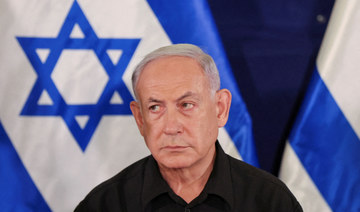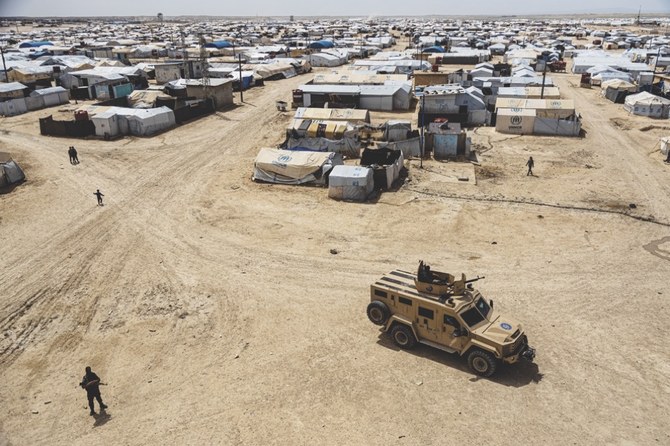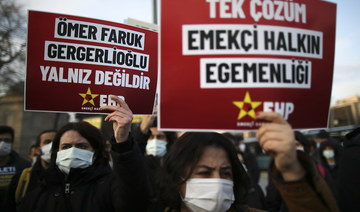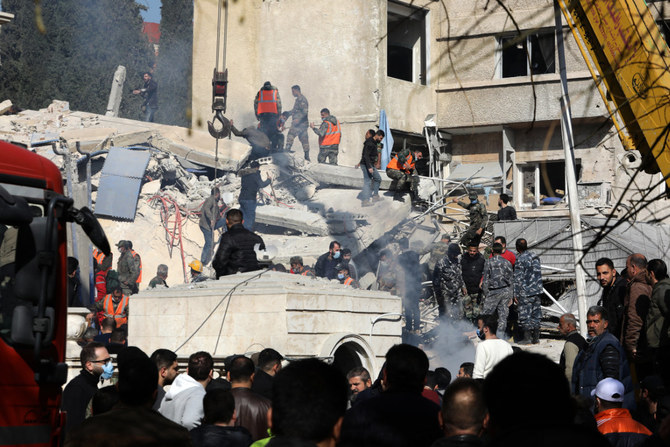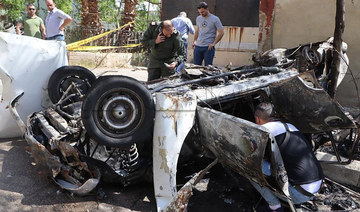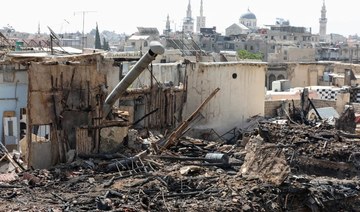DUBAI: Hospitals, clinics and mortuaries in the Gaza Strip have been overwhelmed since the war between Israel and the Palestinian militant group Hamas began one month ago, with only a trickle of vital medical supplies reaching the embattled territory.
Despite the challenges of humanitarian access, the governments of Saudi Arabia, the UAE, Jordan and Egypt have pledged millions of dollars in assistance, negotiating aid deliveries and establishing medical facilities to treat wounded civilians.
“There is no lack of goodwill on the part of Arab nations and peoples to help the Palestinians, at least through humanitarian support,” Ramzy Baroud, a Gaza-born Palestinian-American author, journalist and editor of the Palestine Chronicle, told Arab News.
“The next step is ensuring that that support reaches the victims of this ongoing Israeli genocide.”

About 4,000 children have been killed in Gaza since the conflict began. (AFP)
Officials from Western and Arab nations, the UN, and nongovernmental organizations gathered in Paris on Thursday for a conference on how to provide aid to civilians in Gaza, including proposals for a humanitarian maritime corridor and floating field hospitals.
Representatives from Jordan, Egypt and the Gulf countries attended the conference in the French capital, but Israeli authorities did not participate.
Saudi Arabia will host Arab leaders on Saturday for an emergency session of the Arab League, then a meeting of the 57-member Organization of Islamic Cooperation on Sunday, which Iranian President Ebrahim Raisi is expected to attend.
“Unless influential Arab countries put pressure on Israel through political advocacy at the UN and directly through Washington, neither aid will be allowed, nor the future construction of Gaza will be permitted,” said Baroud.
After the cross-border attack on southern Israel mounted by Hamas on Oct. 7, which resulted in the death of 1,400 people and the abduction of at least 240 others, Israel launched a deadly assault on Gaza, one of the most densely populated places on earth.

As a result, at least 10,500 people trapped inside this cramped, impoverished sliver of territory have been killed by Israeli aerial attacks, and thousands more forced to take shelter inside schools and hospitals after their homes were destroyed.
Only a small amount of humanitarian aid is allowed to enter via Egypt’s Rafah border crossing, and a scattering of people permitted to leave, prompting Antonio Guterres, the UN secretary-general, to describe Gaza as “a graveyard for children.”
Indeed, about 4,000 children have been killed in Gaza since the conflict began, according to the Hamas-controlled health ministry.
“The obvious challenge is that Israel is not allowing the arrival of humanitarian aid through the Rafah border and is refusing to open the Karm Abu Salem crossing (Kerem Shalom), per the request of the UN secretary-general,” said Baroud.
“Israel has repeatedly bombed the Rafah crossing, on the Palestinian side, to send a message that no movement or aid will be allowed. In fact, on Tuesday, they bombed a Red Cross humanitarian convoy carrying urgent aid to Gaza.”
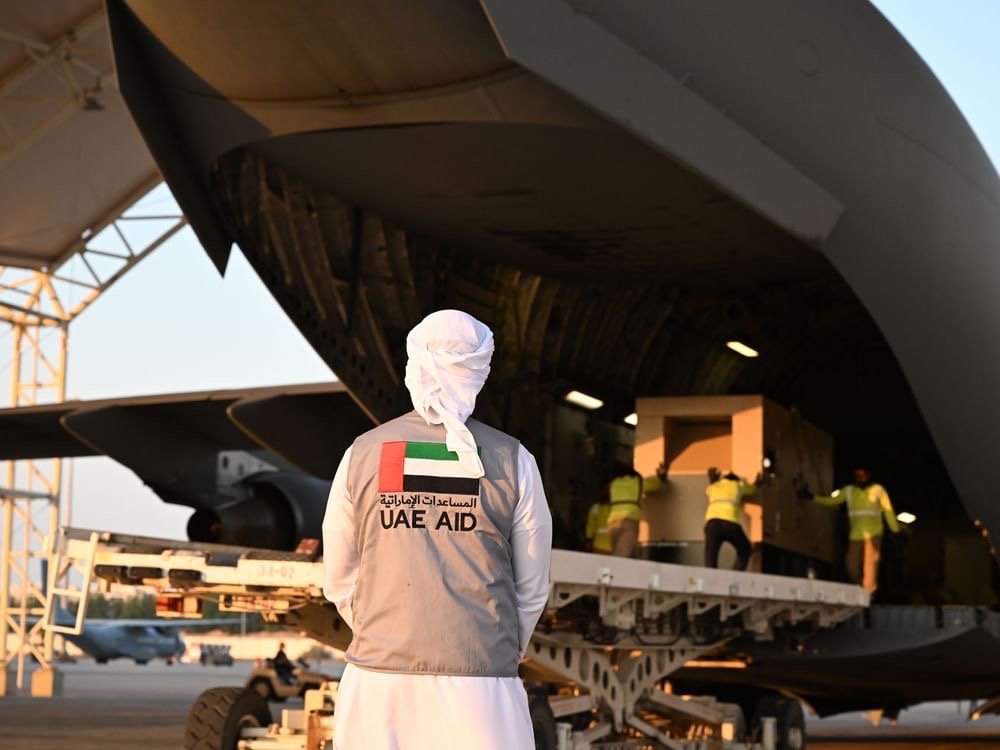
Arab states have launched fundraising campaigns and deployed aid flights to Egypt’s Rafah crossing in response to Gaza’s deepening medical emergency. (WAM)
Even before the latest bout of violence began, the UN said Israel’s 17-year blockade of Gaza had severely crippled the Palestinian territory’s economy, leaving about 80 percent of its inhabitants reliant on external humanitarian aid.
Saudi Arabia has been supporting Palestinian civilians in Gaza through the Sahem fundraising portal, which within five days of its launch received contributions from more than 569,000 donors, exceeding $108 million.
The Public Relief Campaign for Palestinian People in Gaza, affiliated with the King Salman Humanitarian Aid and Relief Center, was specifically launched to support Palestinians suffering under Israeli attack.
Abdullah Al-Rabeeah, KSrelief’s general supervisor, said the campaign was a reflection of “the Kingdom’s historic role of standing beside the brotherly Palestinian people throughout various crises,” according to a statement published by the Saudi Press Agency.
Earlier this week, the KSrelief team held discussions with Osama Nugali, the Saudi ambassador to Egypt, to find ways to accelerate the transport of shelter materials, food, and medical supplies through the Rafah border crossing.
INNUMBERS
• 10,500 People killed since Oct. 7, according to Hamas-run health ministry.
• 1.5m Gazans displaced since fighting began.
• 60 percent Proportion of Gaza’s health facilities already out of service.
• 320 tonnes Humanitarian supplies transported to Gaza in recent weeks.
Additionally, on Oct. 15, Nayef bin Bandar Al-Sudairi, the Saudi ambassador to Jordan, presented a $2 million annual contribution from the Kingdom to the UN Relief and Works Agency for Palestine Refugees in the Near East.
This financial support will enable UNRWA to continue offering vital relief services, such as food, medicine, and humanitarian assistance, to the Palestinian people under siege.
Saudi Arabia’s Crown Prince Mohammed bin Salman has described the attacks on civilians in Gaza as “heinous,” while warning of “dangerous repercussions” in the event of a regional escalation.
Multiple Saudi officials have called for an immediate ceasefire.
With no resolution in sight and the bombardment continuing, the health system in Gaza is swiftly deteriorating, with thousands of patients left without access to essential medical treatment.

Despite the challenges of humanitarian access, the governments of Saudi Arabia, the UAE, Jordan and Egypt have pledged millions of dollars in assistance. (AFP)
The Palestine Red Crescent issued a warning on Nov. 6 that Al-Quds Hospital would run out of fuel within 48 hours. Officials at Al-Awda Hospital, meanwhile, said that the facility is on the brink of shutdown due to critical shortages.
At Al-Shifa Hospital, the largest in the Gaza Strip, an Israeli strike recently destroyed the facility’s solar panels. The hospital, which was already on the verge of collapse, is now grappling with severe shortages, while receiving a continuous flow of wounded.
“According to the latest statements by the Palestinian Ministry of Health, half of Gaza’s major hospitals and 60 percent of the Strip’s health facilities are already out of service,” said Baroud.
“Those that are still functioning are operating on far less than the minimally required equipment, fuel, and medical supplies.
“Never in the history of Israeli wars on Gaza — in fact, anywhere else in Palestine — did a crisis of this magnitude take place. The situation is beyond dire.”
Opinion
This section contains relevant reference points, placed in (Opinion field)
Since Oct. 7, at least 16 of Gaza’s 35 hospitals have been left nonoperational. Additionally, 51 out of the 72 primary healthcare clinics across the Gaza Strip have ceased operations, underscoring the critical challenges faced by the health system in the enclave.
Baroud said that he had been told by his sister, a doctor in southern Gaza, that doctors are having to make extremely difficult choices, on who to treat and who to ignore.
“Surgeries are taking place on the floors of hospitals. Kids have body parts amputated with no anesthesia,” she told him.
“Words cannot describe the collective suffering of the Palestinians. Those who die quickly are the lucky ones.”
In response to the dire situation, Sheikh Mohamed bin Zayed Al-Nahyan, president of the UAE, has announced plans to set up a new field hospital as part of the Gallant Knight 3 humanitarian operation, according to state news agency WAM.

About 1,000 aid trucks are preparing to enter the Gaza Strip in two stages. (Asharq Al-Awsat)
On Monday, five cargo planes departed the Emirati capital, Abu Dhabi, carrying equipment and supplies for the 150-bed facility destined for Arish on Egypt’s Sinai Peninsula.
The field hospital will include departments for general surgery, orthopedics, pediatrics, and gynecology, along with anesthesia and intensive care units. It is designed to serve both adults and children, and will offer internal medicine, dentistry, psychiatry, and family medicine clinics.
Additionally, the UAE has announced plans to admit about 1,000 Palestinian children and their families from the Gaza Strip into its own hospitals for treatment.
Collaborative efforts involving the Egyptian Red Crescent, National Alliance for Civil and Development Action, Haya Karima Foundation, and various international programs, including the World Health Organization and UNRWA, have managed to deliver about 7,950 tons of aid.
Flights carrying assistance from Turkiye, the UAE, Qatar, Jordan and Tunisia have landed in Arish. Meanwhile, Iraq has reportedly donated 10 million liters of oil to Gaza’s hosptials.
Jordan’s King Abdullah II said early on Monday that the Jordanian air force had dropped “urgent medical aid” to its field hospital in Gaza, to provide immediate assistance.
“This is our duty to aid our brothers and sisters injured in the war on Gaza. We will always be there for our Palestinian brethren,” he said on X.

The volume of aid entering so far represents just 4 percent of the daily average. (WAM)
About 1,000 aid trucks are preparing to enter the Gaza Strip in two stages.
However, the UN humanitarian office said the volume of aid entering so far represents just 4 percent of the daily average needed before the hostilities began, and a fraction of what is required as food, water, medicines and fuel stocks run out.
“It goes without saying that an immediate humanitarian ceasefire is critical,” said Baroud.
“A ceasefire means allowing more aid to arrive safely, allowing medical facilities to assess the situation, allowing the dead to be buried with some measures of dignity, and allowing civil defense workers to retrieve at least some of the bodies that are trapped under the rubble.
“If Arabs cannot help Palestine in other ways, and they really should be able to do so, the least they can do is to use their political and economic clout and influence to pressure Israel to allow for a humanitarian ceasefire.”







